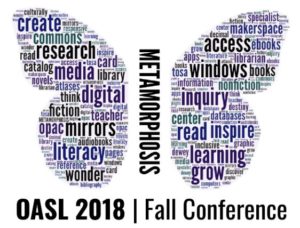 What a treat to spend the weekend with Oregon’s school librarians. And then hearing keynote speakers R. Gregory Christie and Mitali Perkins was just the icing on the cake.
What a treat to spend the weekend with Oregon’s school librarians. And then hearing keynote speakers R. Gregory Christie and Mitali Perkins was just the icing on the cake.
For those who came to my presentation, here are the books I talked about in my session. A selection of new books that are notable in quality and diverse.
Picture Books
Shanyaak’utlaax Salmon Boy from Baby Raven Reads (Tlingit)
The Woman Carried Away by Killer Whales from Baby Raven Reads (Haida)
Picking Berries by Hannah Lindoff from Baby Raven Reads (Tlingit, Haida, Tsimshian)
Raven Brings Us Fire, Raven and the Box of Daylight, Origins of Rivers and Streams: a raven story by Pauline Kookesh Duncan from Baby Raven Reads (Tlingit)
On our Street: our first talk about poverty, and On the News: our first talk about tragedy by Dr. Jillian Roberts
You Hold Me Up by Monique Gray Smith (Cree & English) Canadian Reconciliation
Speaking our Truth a journey of reconciliation by Monique Gray Smith Canadian Reconciliation
How Raven got His Crooked Nose an Alaskan Dena’ina Fable by Barbara J Atwater (Athabaskan)
Whisper of the East: tales from Arabia by Franziska Meiners -glossary plus activities
The Atlas Obscura: Explorers Guide for the worlds most adventurous kid by Dylan Thuras & Rosemanry Masco
Mapping Sam by Joyce Hesselberth —STEM
The Rabbit Listened by Cori Doerrfeld —empathy
Me and my Fear by Franscesca Sanna
Drawn Together by Dan Santat multi-lingual family
We are Grateful Otsaliheligaby Traci Sorell (Cherokee)
Chapter Books
Baby Monkey Private Eye by Brian Selznick
Digging Deep by Jake Maddox—a hijabi athlete
You Choose Books Sleeping Beauty by Jessica Gunderson—a female fairytale choose your own adventure.
Meet Yasmin by Saadia Faruqui
Lucy’s Lab by Michelle Houts
Jasmine Taguchi Super Sleuth by Debbi Michiko Florence (series)
Pocket Pirates: The Great Cheese Robbery by Chris Mould (series)
The Questioners Rosie Revere and the raucous riveters by Andrea Beaty maker mystery
MG novels
The Journey of Little Charlie by Christopher Paul Curtis – About a boy who engages in slave catching and has a change of heart. tangential to Elijah of Buxton
Running on the Roof of the World by Jess Butterworth
About buddhist refugees from Tibet to India. Yaks!
Marcus Vega Doesn’t Speak Spanish by Pablo Caraya—extra tall 8th grader goes home to Puerto Rico for the 1st time
Tight by Torrey Maldonado— urban, black, about the hard choices in MS friendship, older MG
Amal Unbound by Aisha Saeed contemporary Pakistan, indentured servitude
Charlie Hernández the league of shadows by Ryan Calejo fantasy adventure based in central American mythology
Merci Suárez Changes Gears by Meg Medina contemporary coming-of-age multigenerational household
The Crossroads bu Alexandra Diaz contemporary migrant from Guatemala adjusts to life in the US
Dactyl Hill Squad by Daniel José historical fantasy civil war with dinosaurs
Non-fiction
The Faithful Spy: a true story! Dietrich Bonhoeffer and the plot to kill Hitler by John Hendrix
highly illustrated but not a GN it tackles the question: how do I resist evil without doing/becoming evil
Shout: the true story of a survivor who refused to be silenced by Laurie Halse Anderson —a tale of resilience
Unbroken: 13 stories starring Disabled Teens ed by Marieke Nijkamp
Don’t Call Me Crazy: 33 voices start the conversation about mental health ed. by Kelly Jensen
Just Breathe: meditation, mindfulness, movement, and more Malik’s Chopra—one of many mindfulness/yoga/meditation titles this year.
Putting Peace First: 7 commitments to change the world by Eric David Dawson —in a season crowded w/ social justice this one is detailed, practical, do-able by youth.
Short Stories
Flying Lessons and other stories ed by Ellen Oh of WNDB
Funny Girl ed by Betsy Bird
Graphic Novels
Be Prepared by Vera Brosgol
An ethnic twist on the summer camp story. an artful look at social isolation
The Dragon Slayer: Folk tales from Latin America by Jaime Hernandez
Illegal by Eoin Colfer migration from Africa across the Sahara and Mediterranean Sea
Oregon Authors
D-day:the WWII invasion the changed history and Under the Bodhi Tree a story of Buddha by Deborah Hopkinson
Where the Watermelons Grow by Cindy Baldwin
Avalanche Dog Heroes: Piper and Friends learn to search the snow by Elizabeth Rusch
Tigers and Tea with Top by Barbara Kerley
The Turning by Emily Whitman
Journey of the Pale Bear by Susan Fletcher
What do they do with all that Poo by Jane Kurtz
Quiet Please Owen McPhee by Trudy Ludwig
A Boy A Mouse A Spider by Barbara Herkert
 What a treat to spend the weekend with Oregon’s school librarians. And then hearing keynote speakers R. Gregory Christie and Mitali Perkins was just the icing on the cake.
What a treat to spend the weekend with Oregon’s school librarians. And then hearing keynote speakers R. Gregory Christie and Mitali Perkins was just the icing on the cake.
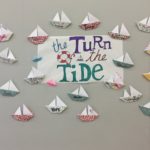 I do a lot of school visits. It’s one of the best parts of my life as an author. A school that is well prepared for my visit and eagerly anticipating a day in celebration of literature, goes a long way to making the work satisfying for me and profitable for students. Sometimes there are even lovely extra touches—a welcome sign hand made by students, a warm cup of tea, the principal who gave me her parking spot because it was snowing—all kind and much appreciated.
I do a lot of school visits. It’s one of the best parts of my life as an author. A school that is well prepared for my visit and eagerly anticipating a day in celebration of literature, goes a long way to making the work satisfying for me and profitable for students. Sometimes there are even lovely extra touches—a welcome sign hand made by students, a warm cup of tea, the principal who gave me her parking spot because it was snowing—all kind and much appreciated.
 For many the real draw in writing for kids is that it sidesteps the literary celebrity culture which can be so toxic in the adult writing world. So even though the adulation was kindly meant it often makes the author on the receiving end more anxious than flattered. As an added bonus, when an author’s human frailties—fairly or unfairly—become a subject of social media, you will not have the shock of their fall from grace because you never excluded them from the human community by putting them on a pedestal in the first place.
For many the real draw in writing for kids is that it sidesteps the literary celebrity culture which can be so toxic in the adult writing world. So even though the adulation was kindly meant it often makes the author on the receiving end more anxious than flattered. As an added bonus, when an author’s human frailties—fairly or unfairly—become a subject of social media, you will not have the shock of their fall from grace because you never excluded them from the human community by putting them on a pedestal in the first place.
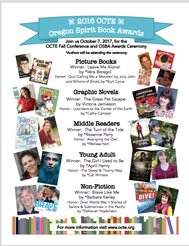 A week from today I will be at the Oregon Council of Teachers of English fall conference to accept the Oregon Spirit book award for The Turn of the Tide. I’m just thrilled to be in the company of the Oregon authors honored this year. Many of these women have been friends and mentors for years, women whose work I’m proud to recommend at the bookstore and books from which I’ve learned much about the craft of writing. Thank you to all those hard working English teachers who served on the award committee and all those who share books in their classrooms.
A week from today I will be at the Oregon Council of Teachers of English fall conference to accept the Oregon Spirit book award for The Turn of the Tide. I’m just thrilled to be in the company of the Oregon authors honored this year. Many of these women have been friends and mentors for years, women whose work I’m proud to recommend at the bookstore and books from which I’ve learned much about the craft of writing. Thank you to all those hard working English teachers who served on the award committee and all those who share books in their classrooms.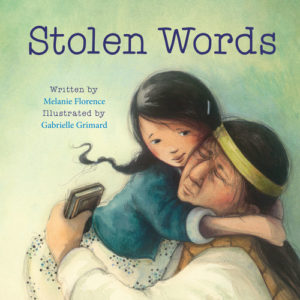 Writing about the ravages of colonial control over First Nations in the United States and Canada is difficult enough when addressing adults. It’s even more challenging when presenting material to the youngest readers. How to convey the seriousness and depth of pain without crushing the spirit of the child reader–it’s a huge challenge, and I admire any author who even attempts to take it on. Few come out with such a successful result as author Melanie Florence in her picture book Stolen Words about her grandfather’s forced enrollment in boarding school and the loss of his mother tongue. Ms. Florence tells the story of a young girl who innocently asks her grandfather how to say grandpa in Cree. He tells her about being taken away from home and punished at the boarding school for speaking his Cree language. Illustrator Gabrielle Grimard captures this beautifully representing the Cree language as a blackbird captured in a cage and locked away. It’s an image that conveys the sadness and brutality of the Canadian boarding school without presenting images too heart-breaking for young readers. The girl finds a Cree dictionary in her own school and brings it to her grandfather and the words on the page, again symbolically, take the fo
Writing about the ravages of colonial control over First Nations in the United States and Canada is difficult enough when addressing adults. It’s even more challenging when presenting material to the youngest readers. How to convey the seriousness and depth of pain without crushing the spirit of the child reader–it’s a huge challenge, and I admire any author who even attempts to take it on. Few come out with such a successful result as author Melanie Florence in her picture book Stolen Words about her grandfather’s forced enrollment in boarding school and the loss of his mother tongue. Ms. Florence tells the story of a young girl who innocently asks her grandfather how to say grandpa in Cree. He tells her about being taken away from home and punished at the boarding school for speaking his Cree language. Illustrator Gabrielle Grimard captures this beautifully representing the Cree language as a blackbird captured in a cage and locked away. It’s an image that conveys the sadness and brutality of the Canadian boarding school without presenting images too heart-breaking for young readers. The girl finds a Cree dictionary in her own school and brings it to her grandfather and the words on the page, again symbolically, take the fo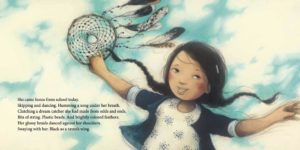 rm of blackbirds and fly free. It’s a simple tale–too simple for older readers certainly who need much more substance and a less tidy resolution. But for the youngest readers this is an important story of native language denied and ultimately regained, and a book well worth celebrating.
rm of blackbirds and fly free. It’s a simple tale–too simple for older readers certainly who need much more substance and a less tidy resolution. But for the youngest readers this is an important story of native language denied and ultimately regained, and a book well worth celebrating.